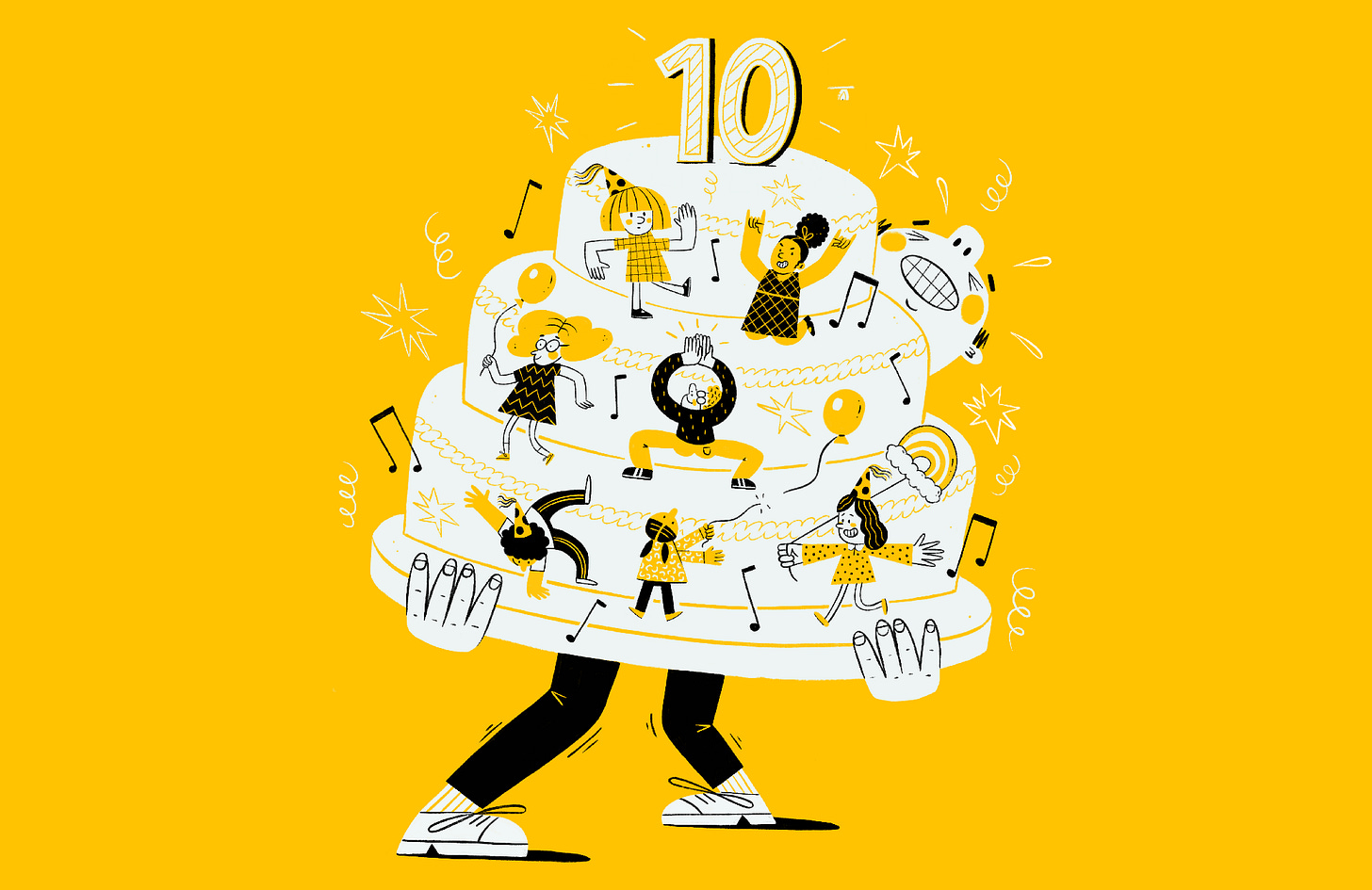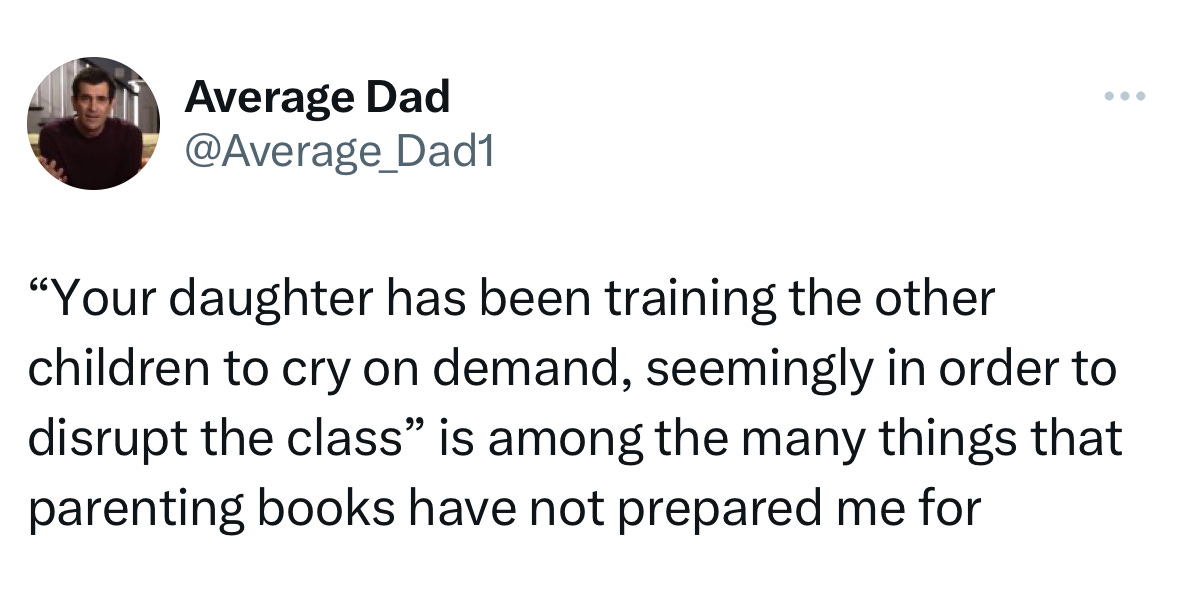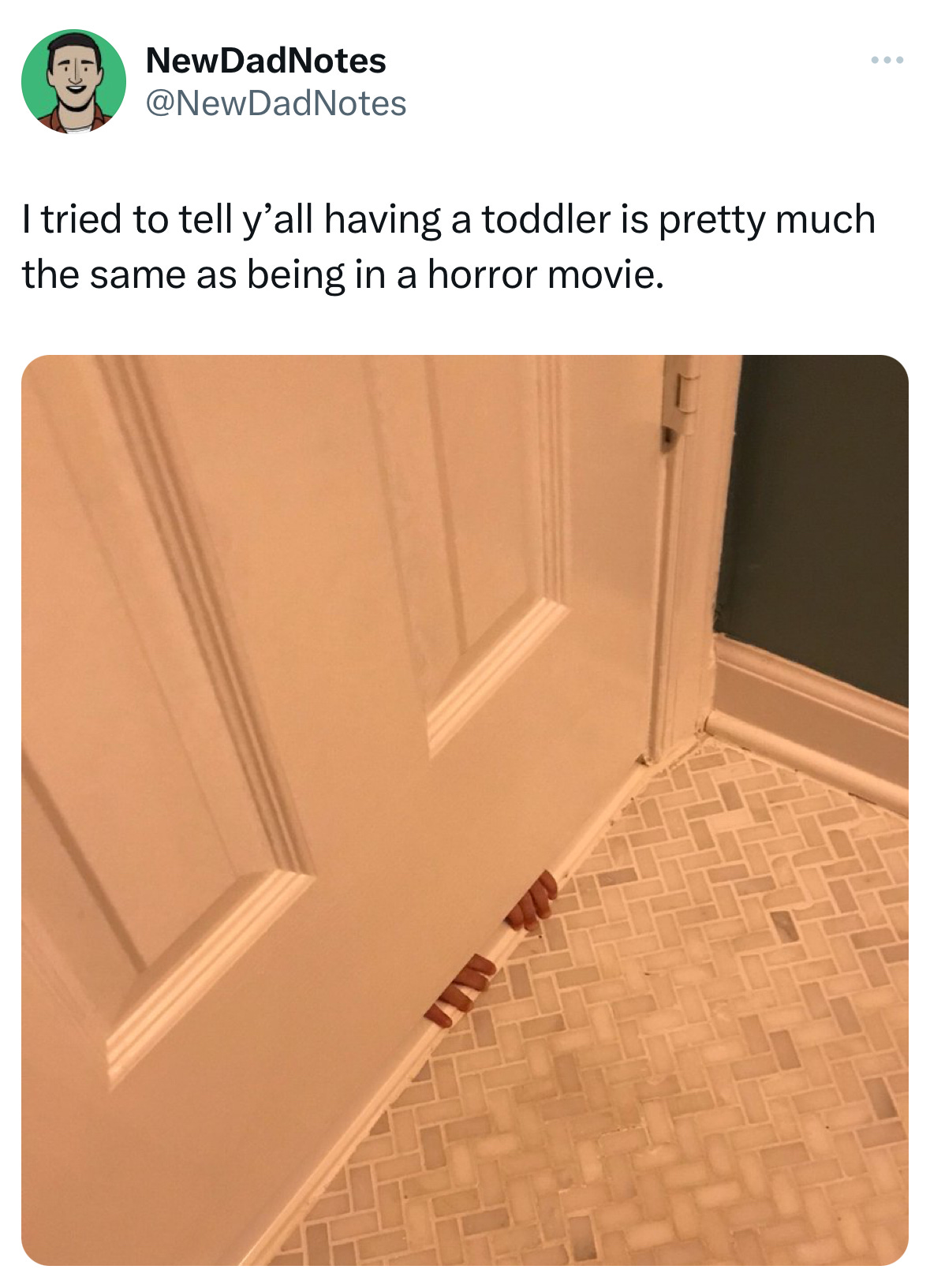A Decade of Parenting
On becoming a double-digit dad

Once upon a time, sometime around this young girl’s 4th birthday, a naive father made an agreement with his firstborn child.
“Here’s the deal,” the dad offered. “You can keep growing older. But only until your 10th birthday. That’s too much. Then, you must stop.”
She thought about it for a moment. Ice cream was offered. The girl nodded in agreement.
In the years that would pass, upon regular repetition of this story, the girl would say, “Papi, (for the child lived in Spain now, and that is how children addressed their fathers there) you know I’m going to keep growing after I hit 10, right?”
The father was shocked. “Are you backing out of our agreement? Because a deal is a deal. We’ve had this one for years now.”
“No, Papi,” the girl would reply. “ I’m not backing out. But you do know I’ll keep getting older, don’t you?”
The daughter had understood and accepted before the father. This day would always arrive—love can’t turn around. I am now a parent to a double-digit child. I’ve clocked up over a decade raising kids. Significant age milestones are fertile times for self-reflection—an activity I’ve often indulged in myself. But now I realise I’ll be deep in it whenever my children enter a new decade. Next time it happens for Padme? She’ll be a child no longer. I can’t help but wonder what my mum thought when I turned ten, twenty, thirty and forty. I guess I’ll never know.
In honour of a decade of parenting, here are a few things I’ve picked up along the way:
THIS TOO SHALL PASS. This adage of Persian origin is a salve to parents everywhere. “Don’t worry,” it whispers seductively in your ear, “it won’t be like this forever.” And no lies were told. Once you begin to worship at the altar of “This too shall pass” your parenting struggles become something to be endured temporarily, rather than a Sisyphean boulder to be rolled uphill for eternity. This phrase will get you through the deepest chasms, the longest nights, the shortest fuses. However, it comes with a warning: those times when everything’s working out? When they’re sleeping, eating and generally doing well? Those will pass too. We’re on the wheel: sometimes we’re up top, other times grinding underneath. Which leads us to …
TO TELL THE TRUTH, THIS COULD BE THE LAST TIME. It’s inevitable you’ll encounter treacle times: the days, weeks, and possibly even months when everything is difficult, and parenting becomes nothing but a slog. During these moments, there’s a tendency to wish the struggle du jour away, eager to hit the next milestone and burst out of this boggy marsh. But as Oscar Wilde once wrote, “When the Gods wish to punish us, they answer our prayers.” Because today’s struggle may be tomorrow’s yearning. Learn the last time meditation—William B Irvine’s simple instruction—and call upon it often:
"When you’re doing something, you should reflect on the possibility that this might be the last time you do it. Again, you don’t dwell on this possibility, it’s just a flickering thought. Doing this can dramatically change your perspective on the events of your daily life. Mowing my lawn can be a burden, particularly on a hot day, but I can lighten that burden by remembering that there will be a last time that I am physically able to mow a lawn, and that after that time has passed, I will likely look back on these as the good old days."
Read more on the last time meditation here.
MORE THAN A FEELING. Parenting isn’t just raising kids. It’s an opportunity to learn, understand and internalise what your own childhood may have lacked. The idea of “reparenting” was born in the psychotherapy community and originally referred to a technique where a therapist would actively assume the role of a parent to treat issues. In recent years, the word has taken on a different definition as a catch-all term for "when [any] adult works to meet their own emotional or physical needs that went unmet in their childhood.” You don’t need to have kids to reparent yourself. But once they’re in front of you, it can be impossible to avoid.
Here’s a concrete example: I’ve had to learn how to let my kids feel the full range of their emotions. This idea will be obvious to many of you. But if you grew up in an environment where it wasn’t encouraged, you may have to do a significant amount of work to get comfortable letting your kids be angry or feel sad without being triggered by it. In order to learn how to allow them to show their feelings, I’ve had to learn to do it for myself too. And emotions are hard! You could make a great movie about them (and a less great, but fairly satisfying sequel too.) Giving your kids the freedom to get angry, sad, scared and experience other “uncomfortable emotions” will be something they will thank you for eventually. You, on the other hand, will feel the benefits much faster.
JUST ADD WATER. A pro-parenting tip that works across the ages. Things getting tense? Anger-levels rising? Kids complaining of being bored five minutes after powering through all the activities you planned for the day? It’s simple: just add water. This might be water to drink from the tap. It may be a bath that you throw them into alongside a break-in-case-of-emergency bath bomb. This massive pack of water balloons and filler pump was an investment that continues to pay dividends. And if you can easily get to a local pool or—even better—a beach, you can be sure that the intensity and animosity will drain away as soon as they hit the water.
DON’T FORGET SNACKS. Remember Bruce Banner’s secret to keeping calm at the end of The Avengers? “I’m always angry.” I think about that moment regularly as I leave the house. Because these kids? They’re always hungry. And they’ll go SuperHulk if you don’t put something into their mouths right this minute. It doesn’t matter if they’ve had three breakfasts already, telling you, “We’re full” as they tie their laces. Within ten minutes they’ll be shouting from the backseat asking if there’s anything to eat in the car. I guarantee it. Repeat after me: ALWAYS. BRING. SNACKS.
SLEEP AS MUCH AS YOU ARE ABLE. This isn’t just for the parents of newborns. That’s obvious—even though the advice to “sleep when the baby sleeps” is only possible if you also “clean up when the baby cleans up” and “hang out the washing when the baby hangs out the washing” too. But getting forty winks isn’t just essential for new parents. Once you’re out of The Tunnel, sleep hygiene will be the most significant contributor to your overall health and well-being. Don’t just listen to me, go read Why We Sleep:
“After thirty years of intensive research, we can now answer many of the questions posed earlier. The recycle rate of a human being is around sixteen hours. After sixteen hours of being awake, the brain begins to fail. Humans need more than seven hours of sleep each night to maintain cognitive performance. After ten days of just seven hours of sleep, the brain is as dysfunctional as it would be after going without sleep for twenty-four hours. Three full nights of recovery sleep (i.e., more nights than a weekend) are insufficient to restore performance back to normal levels after a week of short sleeping. Finally, the human mind cannot accurately sense how sleep-deprived it is when sleep-deprived.”
Bad news for new parents. But there’s hope for the rest of us. I’m a big fan of this iOS setting that winds your phone down at the end of the day, and pairing it with a sleep focus mode can make your glowing rectangle of doom borderline unusable as you approach the adult witching hour. We must use every tool at our disposal to fight the dreaded revenge bedtime procrastination. But getting some extra hours in the morning (or what we call a “lie-in” in the UK1) is an opportunity you should always take. The day your child learns how to pour their own bowl of cereal without turning the kitchen into a crime scene will become as important as the day they took their first steps. And remember: during summer and weekends, any screen time that occurs before you wake up doesn’t count towards their daily total. I think I read that in the Jonathan Haidt book?2
FINALLY: KEEP YOUR DAMN MOUTH SHUT THIS SUMMER.
Otherwise, expect to be asked, “Are we doing that thing today?” every few hours. You have been warned.
3 things to read this week
“The Best Advice for Dads (According to Dads)” by Talya Minsberg in The New York Times. I’m not the only one dishing out tips here. The NYT asked men worldwide to share their best piece of dadvice. The winner for me is the dad who finishes the day by “play[ing] a game called ‘Best Day Ever’ where I make my kids compete to convince me they had the best day and they end up telling me everything that happened at school.” I’m taking that one to the bank.
“Growing Without Schooling” by Austin Kleon. If you’re not subscribed to Austin Kleon’s newsletter, you’re missing some of the best fatherhood writing out there. His entire parenting archive is a goldmine, this recent addition is a perfect example.
“MF” by David Friedman. Unfortunately not a long read about MF DOOM and his five children. Instead, a remembrance of noted economist and Nobel Prize winner Milton Friedman by his son David. Ever wonder what it would be like to grow up the child of a genius? Wonder no longer. Worth a click just so you can understand why “number two” in their house didn’t refer to something you did in the toilet, but as shorthand for “You were right, and I was wrong.”
Never Tell Me The Odds

Huge “the kind of dad I want to be” energy emanating from German vater Paul Vierkant this week. A firm believer in the idea of reuse and recycle—and unwilling to shell out the hundreds of Euros required to purchase the Lego Millennium Falcon—Paul and his son undertook the mammoth task of building it from pieces they already owned. The first step was sorting through their 50,000 blocks to pull out 6,500 they could use before ordering an additional 1,000 pieces to complete the set. The result is this technicolour marvel you see above.
The Lego community apparently call these “trash builds.” Hook them to my veins.
Good Dadvice
Say Hello
This is weekly update #150. How did that happen? Thanks for hanging around while I get this train back on the road. How was it for you?
Loved | Great | OK | Meh | Bad
Branding by Selman Design. Illustration by Tony Johnson. Survey by Sprig.
I asked what the US equivalent of a lie-in was in our dad community and was told there wasn’t one. One non-US dad suggested “freedom kip,” which I’m happy to say is now canon.
If it wasn’t blatantly obvious, THIS IS A JOKE.







Great to have you back in my inbox. I hope you and the family are are through the sharpest side of the grief.
My kids are now 12 and 15 and I feel like I've walked smack into the next stage of parenting like a glass door I didn't see. Most of the time it feels like I've got young adults, only sometimes do they feel like kids and rarely my little babies. It's an awe filling experience to reflect on how far they've come, how amazing they are now, and how excited about what comes next for them I am. And sometimes that voice in my head says I might even be a half decent parent too, which is nice.
“On becoming a double-digit dad” — I thought maybe you decided to up the ante and add 8 more kids to the family. That would have been true commitment to fatherhood.